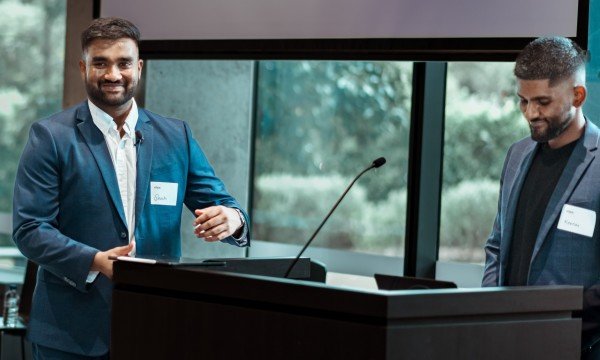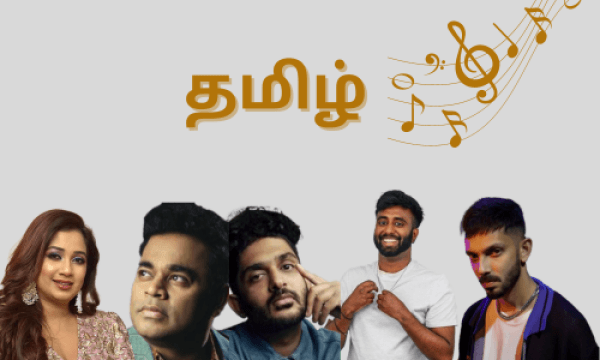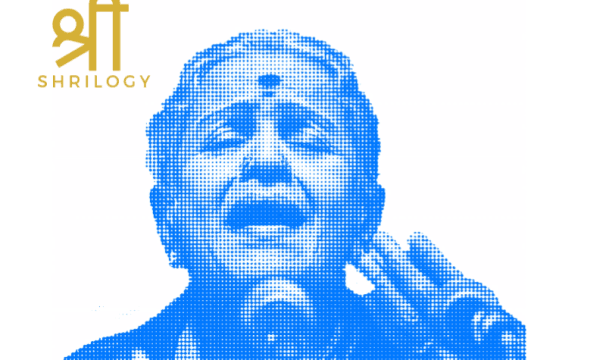
Sahi Siva is a talented international independent Tamil artist from the UK. Currently, he's embarking on a thrilling worldwide tour to bring his second album, Unnaale, to life on stage. I had the incredible opportunity to sit down with Sahi and explore the inspiration behind Unnaale and the transformative moments that propelled him into a full-time music career.
Meet your match at myTamilDate.com!
Sahi's story begins even before his birth, in a love letter exchanged between his parents. Sahi reveals that his father wrote his mother a love letter containing the line, 'Aan pilla pirantha, peyar Sahiththiyan,' loosely translating to 'If we have a son, his name will be Sahiththiyan.' Sahi explains that the significance of his name lies in its definition, which means 'lyrics and literature' in Tamil. Reflecting on this anecdote, Sahi sees it as symbolizing music as his birthright.
At the age of five, Sahi began learning Sangeetham and Mridangam. Raised by Tamil school teachers, he became proficient in Tamil through his parents. By age 15, Sahi purchased a guitar and commenced learning guitar and piano. Subsequently, at 18, he performed his arangetram (debut stage performance) in Sangeetham and Mridangam alongside his sister. During his university years, Sahi participated in cultural events, including the Mega Maalai show at Imperial College London, where he gained exposure. Posting covers on Instagram further bolstered his visibility, ultimately capturing the attention of MC Sai, who invited him to join his label, Oru Nation.
Under Oru Nation's banner, Sahi launched his debut album, Vaeraan, and released his viral feature single alongside Ratty Adhiththan named 'Naan Kudikka Poren,' within four years of being signed. He also embarked on global tours alongside MC Sai, visiting countries like Malaysia and Singapore. "It felt like being part of a boy band, like One Direction, and those were some of the best years of my life."
Despite his flourishing music career, Sahi grappled with balancing his master's degree in mechanical engineering. The COVID-19 pandemic heightened matters, disrupting his touring schedule. Utilizing the downtime, Sahi completed his master's degree and secured a position at a Fintech bank. However, he became increasingly dissatisfied with his corporate trajectory, realizing his disconnected commitment to music.
Consequently, Sahi confided in his parents about his yearning to pursue music full-time for two years, assuring them a return to his regular employment if unsuccessful. With their blessings, Sahi resigned from his job, relocated to Canada, and dedicated himself entirely to music for two years. This endeavour culminated in the completion of his album and the commencement of his world tour in 2024.
I asked Sahi, "What compelled you to pursue a music career?"
Sahi recounted that around 19 or 20, his aspirations aligned with a conventional path: to become a mechanical engineer, graduate, secure employment, acquire a home, and marry. However, three or four years later, his trajectory shifted. Initially disinterested in Sangeetham classes, he persevered at his mother's insistence.
Reflecting now, I'm grateful she pushed me because, a decade later, I'm making a living through music. Despite her initial reservations, it's heartening to know she believed in me and saw potential before I did.
As Sahi's musical talents grew, so did the recognition. People started expressing how he inspired them to explore music. "That was a significant turning point for me," Sahi reflects. "I realized I had a responsibility as an artist to advance my craft, inspiring others in the process."
For Sahi, music transcended mere enjoyment; it became his life's purpose. He embraced the responsibility of nurturing his talent, envisioning himself as a beacon for future generations, motivating them to embark on their musical journeys.
I asked Sahi to recount a memorable musical experience from his childhood that remains deeply etched in his memory.
Sahi shared that one of his fondest memories occurred when he was 15 or 16. He wrote a song for his mother's birthday and performed it alongside his sister. "That moment is indelibly etched in my mind because it marked the inception of my songwriting journey. Witnessing my mother's tears of joy was immensely gratifying. It was a happy moment for everyone, and it made me realize I could write songs."
Sahi's journey underscores a transition from a conventional career path to pursuing music, fueled by family encouragement and the transformative influence of community support. It culminates in his mother's acknowledgment of his dedication and achievements.
I asked Sahi to elaborate on the inspiration and significance behind Unnaale.
Sahi explains that Unnaale is a love-centred album crafted to narrate a story from beginning to end. Enriched with genuine emotions and experiences, it aims to capture the intricacies of love and relationships. The album draws from personal insights and anecdotes observed by others, and the album's lyrics offer an authentic and relatable exploration of life's emotional spectrum. "It's almost like watching a movie; you're hearing an attempt at a cinematic experience," Sahi remarks.
He further describes that Unnaale means "because of you." Therefore, the entire album is a tribute to the concept of "you."
Sahi's albums, particularly Ammamma and Unnaale are heavily influenced by Canadian Tamil creators. Film producers, dancers, and leading collaborators are all based in Canada. I asked Sahi, "Do you believe Tamil artists in Toronto played a significant role in shaping the album?"
Sahi replies, "I can confidently say that without a shadow of a doubt, yes."
He explains how remarkable it is that certain details in the Ammamma music video wouldn't have happened if Johnavan, the director, hadn't suggested them.
Sahi also highlights the collaboration with Thipika and Sobika from Palan Works on the Unnaale music video, emphasizing their tremendous inspiration and motivation.
Expressing his appreciation and gratitude, Sahi acknowledges Johnavan, Wild Rabbit, Palan Works, Jesi Sadayar, and the entire crew who worked on the Ammamma music video. "Honestly, the influence of the Canadian Tamil community on my creativity is immense. This album wouldn't be half of what it is without these individuals."
I asked Sahi to elaborate on the creative process of creating a lively piece like Ammamma and how it differs from crafting a more mellow piece like Unnaale.
Sahi shared that he begins by conceptualizing the songs with a story in mind, already envisioning a theme and concept he wants to convey in the music videos. When he approached Thipika for the Unnaale music video, he gave her a general idea of the story and concept he had in mind. Thipika used Sahi's notes as a starting point and returned to him with a mood board that impressed him.
Similarly, for Ammamma, Sahi shared his vision for the song with Johnavan, who immediately understood the assignment. Sahi explained that he and the directing team aimed to create a cinematic universe around the music videos, where all videos share similar elements to fit into a larger narrative. Sahi remarked, "For example, we discussed including a beginning sequence with 'Ponnu Pakka' (seeing the girl for the first time), which we agreed would be a great addition. Then, we linked it to the other music videos differently. That's the bigger picture of the cinematic universe we're building."
I followed up on Sahi's answer: "I find it interesting how you included the 'Ponnu Pakka' scene because it's a nostalgic element that is still relevant today. The 'Ponnu Pakka' scene was visually captured well because it represents Tamil tradition."
Sahi responded, "It was particularly significant for me because I knew this would be a major music video based in Toronto, Canada."
He further explained that he thought involving people he admires within the Toronto creative space for that sequence would be nice. The concept was scripted just half an hour before filming. Sahi expressed, "It was amazing to witness how well everyone bounced off each other, drawing from real experiences."
For Sahi, that sequence was a way to express his gratitude to the Toronto Tamil community for continuing to inspire others.
Experience the electrifying beats of Ammamma, the soul-stirring melodies of Unnaale, and the captivating storyline of Straight Outta Thirupathi from the Unnaale album, now streaming on YouTube!
I asked Sahi to share some of his biggest challenges in his career.
Sahi mentioned that travelling had taken a toll on his physical health, disrupting his sleep patterns. Additionally, he finds being away from home difficult, as it distances him from his family and friends. "Not being physically present with family and friends is always tough."
He also highlighted the significant financial constraints of being an independent artist. "The financial aspect isn't as stable as one would hope, and I'm still working to reach a point where it becomes more sustainable." Despite these challenges, Sahi remains hopeful that he will overcome his financial constraints, emphasizing that the challenges are worth it because of the positive impact of his work.
I asked Sahi, "How important is it for you to portray the Tamil identity in your music?"
Sahi responded, "Tamil is everything to me." He explains that the Tamil language is ingrained in his entire life, from his parents and relatives to his circle of friends. Sahi shared that he feels fortunate to have parents who were Tamil teachers and instilled in him a deep appreciation for the language. He also reflected on the current and future generations who may have different privileges.
"I believe it's crucial that through my music, I strive to promote the language as much as possible, making it trendy and accessible to everyone." For this reason, Sahi incorporates English words into his songs to enhance their commercial appeal and reach a wider audience, all while spreading the richness of the Tamil language as far as possible.
My final question to Sahi was to share something he wished he had known before starting his musical career.
Sahi says, "I wish I had doubted myself less. I'm content with how things are going now, but there was a long period where every day was filled with self-doubt. I kept telling myself, "You can't do this, you can't do this." Eventually, I realized I should go for it. If it fails, it fails. I wasted so much energy doubting myself when I could have used that energy to pursue my goals."
It was a pleasure to connect with Sahi Siva! As he embarks on his Unnaale tour, visit his Instagram for all the exhilarating details on tour dates and more!
Catch podcast episodes of 'Identity'!



























